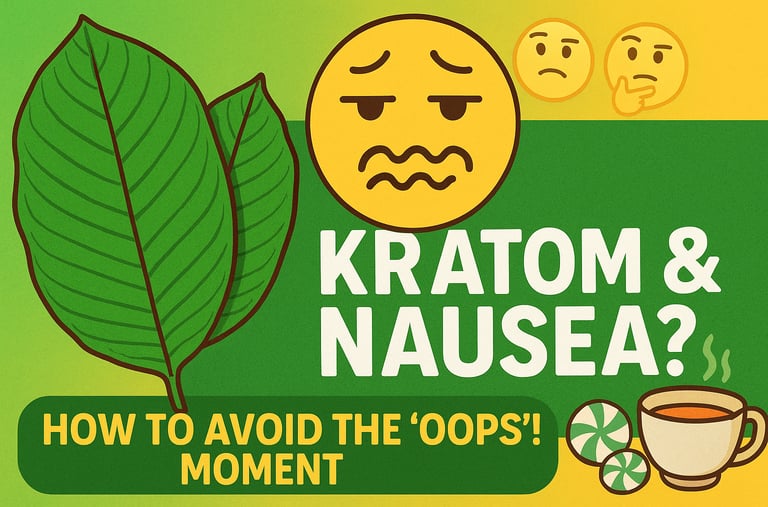High quality - Fast Delivery - Easy payment
Can Kratom Make You Vomit? Here's What You Need to Know
Curious if kratom could cause nausea or vomiting? Dive into our easy-to-understand guide that explains why it happens, practical tips to avoid it, and how kratom can safely fit into your routine. #kratom vomiting, kratom nausea, kratom side effects, safe kratom use, kratom dosage
6/30/20253 min read


Introduction: Why We're Talking About Vomit (Sorry!)
Alright, let's be honest—nobody really enjoys talking about vomiting. But if you're exploring kratom, it's crucial to understand all sides of this fascinating botanical—including the less glamorous ones. Today, I’ll cover a common concern: "Can kratom make you vomit?" Stick with me; I promise to keep it light-hearted and informative.
What Exactly Is Kratom Anyway?
Before diving into the main question, let me quickly introduce you to kratom. Kratom, scientifically known as Mitragyna speciosa, is a tropical evergreen tree native to Southeast Asia. Its leaves contain active alkaloids, primarily mitragynine and 7-hydroxymitragynine, known for their stimulating and relaxing effects.
People typically use kratom for:
Boosting energy
Enhancing mood
Relaxation
Alleviating discomfort
Sounds good, right? But like any substance, it’s not without potential side effects—yes, including the possibility of nausea or vomiting.
Can Kratom Actually Make You Vomit?
Here's the straightforward answer: Yes, kratom can sometimes make you feel nauseous or even vomit, especially if you're new to it or take too high a dose.
According to a 2021 review published in the Journal of Ethnopharmacology, nausea is one of the most commonly reported adverse effects among kratom users. However, it's typically mild and manageable if you know how to approach it properly.
Why Does Kratom Cause Nausea?
Let me break down why kratom can sometimes upset your stomach:
High Dosage: Taking too much kratom at once is the number one reason people experience nausea.
Empty Stomach: Consuming kratom without food can irritate your stomach lining, leading to discomfort.
Tolerance Level: Beginners have a lower tolerance, so even small doses can sometimes trigger nausea.
A Personal Story to Make You Smile (And Maybe Cringe)
When I first tried kratom, I enthusiastically gulped down a strong dose on an empty stomach—rookie mistake! Within 30 minutes, my excitement turned into a queasy rollercoaster ride. Lesson learned: respect the kratom!
How to Safely Use Kratom and Avoid Vomiting
Good news—nausea is avoidable with a few practical tips:
Start Low and Go Slow: Begin with a small dose (1–2 grams), especially if you're new, and slowly increase if needed.
Eat Something First: A small meal or snack beforehand can protect your stomach.
Stay Hydrated: Kratom can be dehydrating. Drink plenty of water to help digestion and absorption.
Choose Quality Kratom: Low-quality or contaminated kratom can exacerbate nausea. Always buy from trusted, reputable sources.
Managing Kratom-Related Nausea
If nausea occurs, don’t panic! Here’s what you can do:
Ginger Tea: Ginger has natural anti-nausea properties and works wonders.
Peppermint: A peppermint tea or candy can soothe your stomach.
Lie Down and Rest: Sometimes, simply lying down for a bit helps significantly.
The Balanced View: Other Potential Side Effects
Besides nausea, some people might experience:
Dizziness
Constipation
Dry mouth
Fatigue (at higher doses)
However, these effects are usually dose-dependent and manageable. Adjusting your kratom usage often resolves these issues.
Conclusion: Respect the Leaf, Enjoy the Benefits
In summary, yes, kratom can cause vomiting, but it's generally preventable and manageable. Kratom has enhanced countless people's routines with increased energy, better moods, and improved relaxation. Just approach it responsibly—start slow, pay attention to dosage, stay hydrated, and buy high-quality products.
Ready to explore more about this fascinating plant? Dive deeper into our kratom guides and unlock the potential of kratom in your daily life—minus the stomach trouble!
References
Grundmann, O., Brown, P. N., Henningfield, J., Swogger, M., & Walsh, Z. (2021). "The therapeutic potential and risks of kratom: a comprehensive review." Journal of Ethnopharmacology, 281, 114497. https://doi.org/10.1016/j.jep.2021.114497
Prozialeck, W. C., Jivan, J. K., & Andurkar, S. V. (2021). "Pharmacology of Kratom: An Emerging Botanical Agent With Stimulant, Analgesic and Opioid-Like Effects." The Journal of the American Osteopathic Association, 121(6), 437-450. https://doi.org/10.1515/jom-2020-0223
American Kratom Association. (2024). "Responsible Kratom Use." Retrieved from https://www.americankratom.org/responsible-use
Terms & Conditions
No sales are permitted to individuals under the age of 18, pregnant women, or those who are breastfeeding. Our products are sold strictly for research purposes only and have not been evaluated by the Food and Drug Administration (FDA) and are not intended to diagnose, treat, cure, or prevent any disease. By placing an order, you acknowledge that you have read, understood, and agreed to these Terms & Conditions. Do not order if you do not agree to these Terms & Conditions.
Contact
info@kratominthailand.com
© 2024. All rights reserved.
Line: botanicals.297
